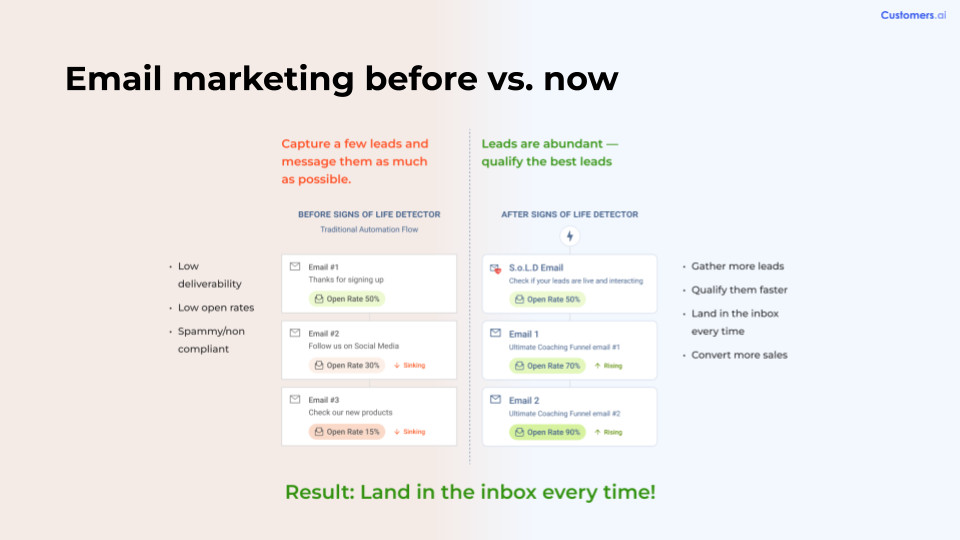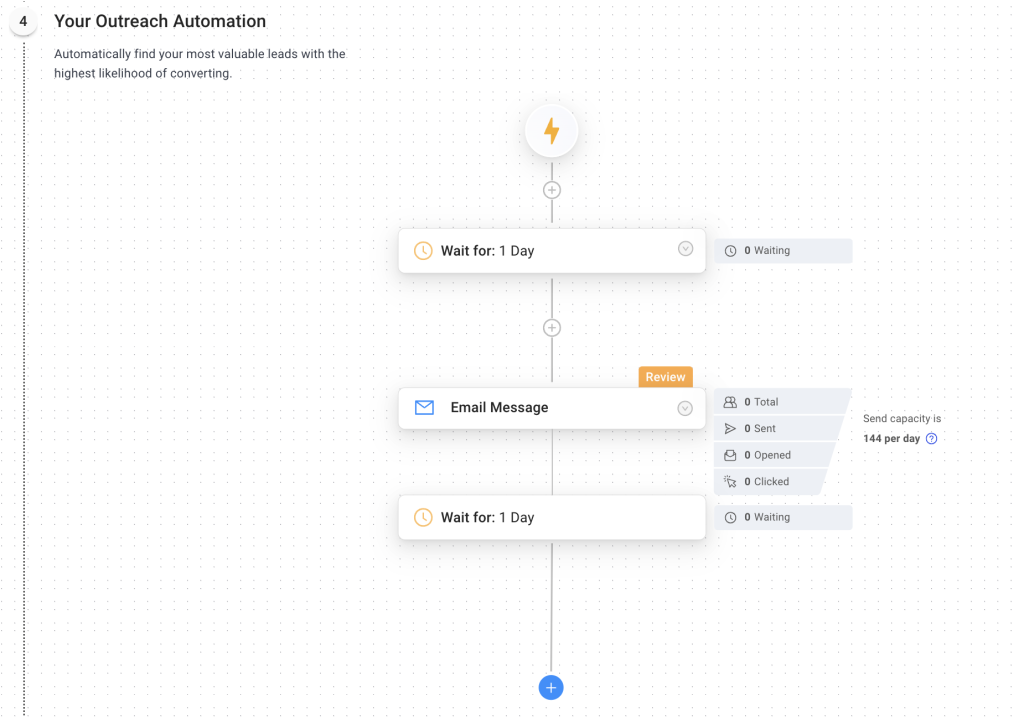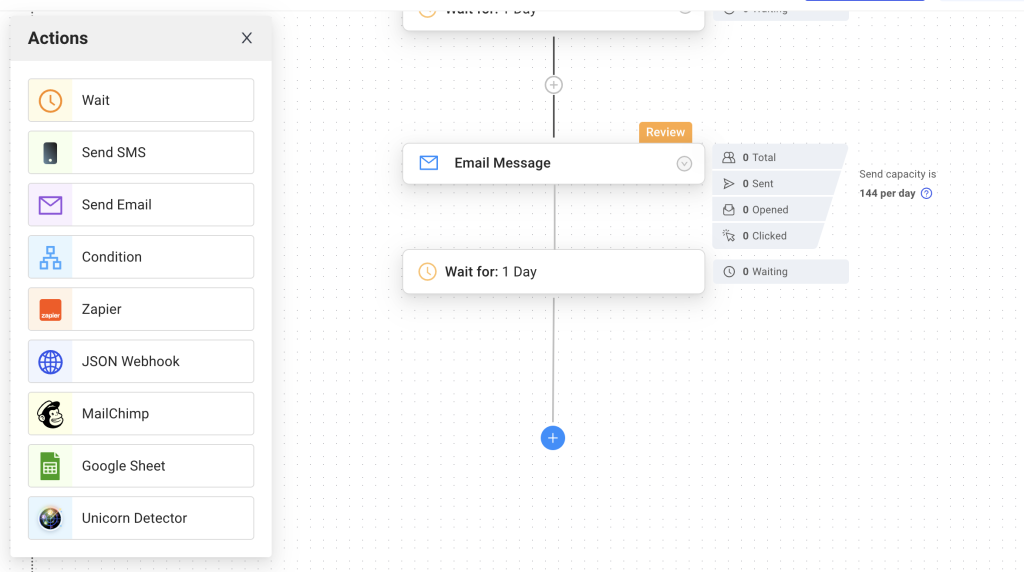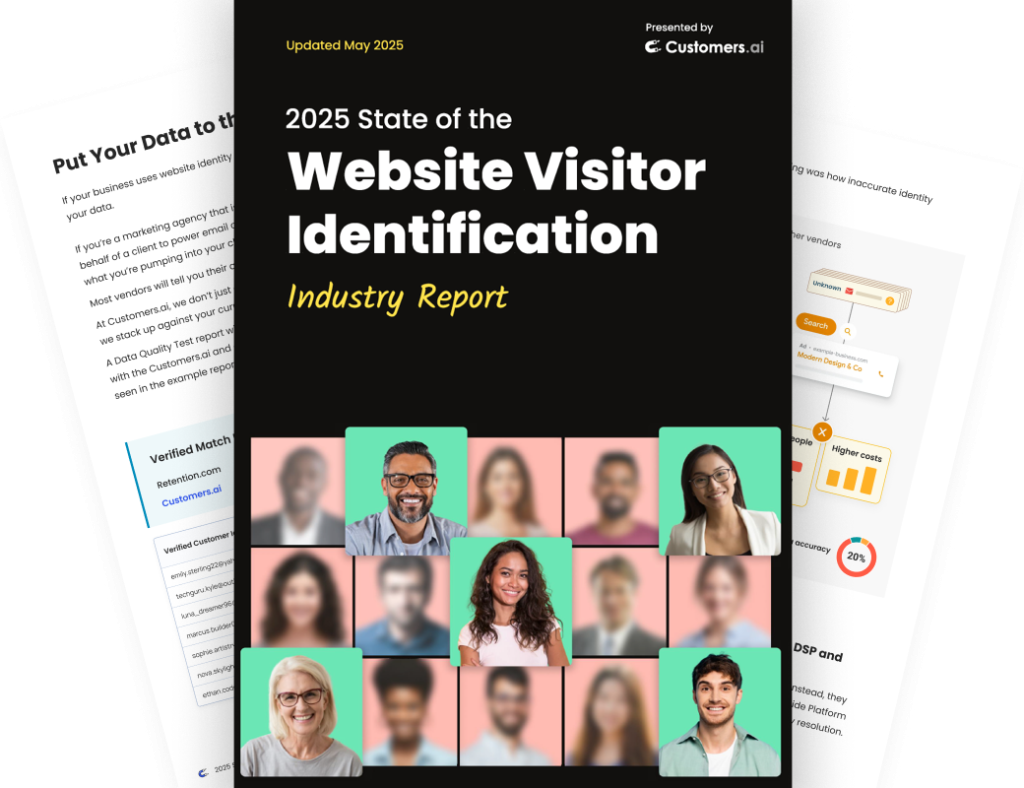Email marketing is a tried and true tactic for businesses. It helps them connect with their customers, build relationships, and drive sales. AI email marketing is the next frontier.
With the sheer volume of emails flooding inboxes every day, it’s becoming increasingly difficult to stand out and make an impact.
By leveraging the power of AI, businesses can create more personalized and targeted email campaigns. These are more likely to resonate with their audience.
In this blog post, we’ll explore what AI email marketing is, the benefits it offers, and some of the tools and technologies that make it possible. Join us as we dive into this exciting world of and discover how it can help take your email campaigns to the next level.
- What is AI Email Marketing?
- Benefits of AI Email Marketing
- Best Practices for Implementing AI in Email Marketing
- AI Email Marketing Challenges and Solutions
- Examples of AI Email Marketing
- Best Tools for AI Email Marketing in 2023
- Future of AI Email Marketing
- AI Email Marketing FAQs
Convert Website Visitors into Real Contacts!
Identify who is visiting your site with name, email and more. Get 500 contacts for free!
What is AI Email Marketing?
AI email marketing is the use of artificial intelligence, machine learning, and other advanced technologies to optimize and automate email marketing campaigns.
At its core, AI email marketing is about using data and algorithms to create personalized and targeted emails that are more likely to resonate with the recipient.
Basically: its role is to make your life easier and your company more successful at the same time.
One of the key features is its ability to analyze large amounts of data about customer behavior and preferences.
By tracking how customers interact with emails (such as which links they click, when they open them, and how long they spend reading), AI algorithms can identify patterns and insights that human marketers might miss. These make your emails more deliverable.
Using this data, you can then create highly personalized email content that speaks directly to the recipient’s interests and needs.
For example, an AI-powered email might include product recommendations based on the recipient’s purchase history or browsing behavior.
You can also automate various aspects of the email marketing process, such as segmentation, scheduling, and A/B testing. By taking care of these tasks automatically, businesses can save time and resources while still achieving better results.
This offers a powerful way to improve the effectiveness and efficiency of email marketing campaigns, while also creating a more personalized and engaging experience for customers. Better results with less work!
Benefits of AI Email Marketing
AI in email marketing brings a transformative edge, providing benefits such as hyper-personalization, precise segmentation, and automated efficiency to elevate engagement and drive unparalleled success in their campaigns.
Increased personalization
One of the biggest benefits is its ability to personalize emails at scale. By analyzing customer data and behavior, AI algorithms can create highly targeted and relevant email content that speaks directly to the recipient’s interests and needs. This level of personalization can lead to higher open rates, click-through rates, and ultimately, conversions.
Improved targeting and segmentation
AI can help businesses segment their email lists more effectively. By analyzing customer data, AI algorithms can identify different segments of customers based on factors such as demographics, behaviors, and preferences. This allows businesses to send more targeted and relevant emails to each segment. Which leads to, you guessed it, higher engagement and conversions.
Higher open rates and click-through rates
Email marketing campaigns using AI are more personalized and targeted. Because of this, they tend to have higher open rates and click-through rates than traditional email marketing. By sending emails that are more likely to resonate with the recipient, businesses can increase the chances that they will take action and engage with the content.
Automation efficiency and cost savings
AI can automate can automate many aspects of the email marketing process, such as segmentation, scheduling, and A/B testing. This can save businesses time and resources, allowing them to focus on other areas of their marketing strategy.
Predictive analytics for better emails
AI enables the utilization of predictive analytics to forecast user behavior, allowing marketers to anticipate the needs and preferences of their audience. By analyzing historical data and patterns, businesses can send targeted emails that align with individual customer journeys, resulting in higher conversion rates and customer satisfaction.
Dynamically optimized email content
AI empowers marketers to dynamically optimize email content based on real-time user interactions and preferences. Through machine learning algorithms, emails can adapt and evolve to deliver the most relevant and engaging content to each recipient. This ensures that email campaigns remain fresh, compelling, and highly tailored, ultimately maximizing the impact on the audience.
A/B testing for patterns and insights
AI facilitates sophisticated A/B testing by quickly and automatically analyzing vast amounts of data to identify patterns and insights. This enables marketers to refine and optimize their email campaigns in real-time, determining the most effective subject lines, content, and CTAs. With AI-driven A/B testing, businesses can make data-driven decisions to continuously improve the performance of their email marketing efforts.
Email Deliverability Hacks:
Unlocking Inboxes


HOSTED BY
Larry Kim
Founder and CEO, Customers.ai
Best Practices for Implementing AI in Email Marketing
Incorporating AI into your email marketing strategy requires a thoughtful approach, encompassing the careful selection of tools, seamless integration into existing workflows, and a steadfast commitment to maintaining data privacy and compliance. Let’s look at best practices to ensure a successful implementation of AI in your email campaigns.
1. Choosing the Right AI Email Marketing Tools and Platforms:
- Research and Evaluate: Conduct thorough research to understand the specific needs of your business. Evaluate different AI email marketing tools and platforms available in the market, considering factors such as features, scalability, and compatibility with your existing systems.
- Trial Periods and Demos: Take advantage of trial periods and product demos offered by AI email marketing vendors. This allows you to experience the capabilities of the tools firsthand and assess how well they align with your email marketing objectives.
- User Reviews and Case Studies: Explore user reviews and case studies to gain insights into the real-world performance of AI email marketing tools. Learning from the experiences of other businesses can help you make informed decisions and choose the tools that best suit your requirements.
2. Integrating AI Seamlessly into Existing Email Marketing Strategies:
- Start with a Pilot Program: Begin the integration of AI into your email marketing strategy with a small-scale pilot program. This allows you to test the impact of AI on a limited basis and make adjustments before full-scale implementation.
- Collaboration Across Teams: Foster collaboration between marketing, IT, and data analytics teams. Ensure that everyone involved understands the goals of integrating AI and works together to streamline the process, ensuring a smooth transition and effective utilization of AI capabilities.
- Training and Skill Development: Provide training for your marketing team to familiarize them with the AI tools being implemented. This helps in maximizing the potential of the technology and encourages the team to adapt and innovate in their email marketing efforts.
3. Ensuring Data Privacy and Compliance with AI-Powered Campaigns:
- Adherence to Data Regulations: Stay informed about data protection regulations, such as GDPR or CCPA, and ensure that your AI-powered email marketing campaigns comply with these regulations. This includes obtaining proper consent for data usage and respecting users’ privacy rights.
- Secure Data Handling: Implement robust security measures for the storage and handling of customer data. Utilize encryption methods, access controls, and other security protocols (including a proxy service) to safeguard sensitive information and build trust with your audience.
- Transparency in Communication: Clearly communicate to your audience how AI is used in your email marketing campaigns. Be transparent about the data collected, the purposes behind its usage, and the benefits it brings. This transparency builds trust and reinforces your commitment to ethical and responsible AI practices.
By following these best practices, you can capture the full potential of AI in email marketing, elevating your campaigns with precision, personalization, and compliance, and ultimately forging stronger connections with your audience.
AI Email Marketing Challenges And Solutions
The integration of AI in email marketing brings forth a spectrum of challenges, from data quality concerns to resistance to change; however, understanding and addressing these hurdles head-on with strategic solutions is key to unlocking the unparalleled benefits that AI has to offer in revolutionizing your email campaigns.
Let’s look at five common challenges and break down the solutions for each one.
1. Challenge: Lack of Quality Data for AI Training
Solution: Data Cleansing and Enrichment
Regularly cleanse and enrich your data to ensure its accuracy and relevance. Implement data validation processes and leverage third-party tools to fill in missing information. High-quality data is essential for training AI models effectively.
2. Challenge: Overcoming Resistance to Change
Solution: Employee Training and Change Management
Provide comprehensive training programs to familiarize your team with AI technologies and their benefits. Implement effective change management strategies, emphasizing the positive impact AI can have on efficiency and results, to overcome resistance and foster a culture of innovation.
3. Challenge: Integration Complexity with Existing Systems
Solution: API Integration and Scalable Solutions
Choose AI email marketing tools that offer seamless integration with your existing systems through well-documented APIs. Prioritize scalable solutions that can adapt to the growth of your business, allowing for a smooth and efficient integration process.
4. Challenge: Ensuring AI-Generated Content Quality
Solution: Continuous Monitoring and Optimization
Implement a system for continuous monitoring of AI-generated content. Regularly review and optimize the output to maintain quality standards. Combine AI automation with human oversight to ensure that the content aligns with brand voice and resonates with the target audience.
5. Challenge: Ethical Use of AI in Email Marketing
Solution: Establish Ethical Guidelines and Regular Audits:
Develop and adhere to ethical guidelines for the use of AI in email marketing. Conduct regular audits to ensure compliance with these guidelines, emphasizing transparency in communication and respecting user privacy. This proactive approach builds trust and aligns your AI practices with ethical standards.
By addressing these common challenges with strategic solutions, businesses can navigate the complexities of implementing AI in email marketing and unlock the full potential of this transformative technology.
Convert Website Visitors into Real Contacts!
Identify who is visiting your site with name, email and more. Get 500 contacts for free!
Examples of AI Email Marketing
Some of the most successful and cutting-edge businesses already ahead. Better to be like them than their competitors, yeah?
Netflix

Netflix uses AI algorithms to personalize their email content based on each subscriber’s viewing history and preferences. For example, if a subscriber has been watching a lot of action movies, they might receive an email recommending a new action movie release.
Sephora

Sephora uses AI-powered chatbots to provide personalized makeup recommendations to customers via email. By analyzing customer data and preferences, the chatbot can suggest products that are tailored to each individual’s needs.
Spotify

Spotify uses AI algorithms to create personalized playlists for each user based on their listening history and preferences. They then send personalized emails to each user with recommendations for new songs and playlists based on their listening habits.
Best AI Email Marketing Tools for 2023
AI Email Marketing Tool #1: X-Ray Email Extractor
What’s the most important part of email marketing? Getting the emails in the first place!
Customers.ai’s X-Ray email extractor makes getting high-quality leads a snap. All you have to do is install a bit of code to your site. Your reward? The names and email addresses of up to 20% of the anonymous visitors to your website.
These are leads who already know who you are and are already interested.
Here’s how to install it on your site:
To get the most out of the tool, we recommend setting it up on high-intent pages. Then, you can set up email automations targeted by the pages they visited. Here’s how to set that up:
From there, you can start turning your website traffic into revenue!
AI Email Marketing Tool #2: Automated Email Generator
What’s the most important part of email marketing? Getting emails!
But it can be a real pain. Coming up with personalized campaigns for every page? Every type of customer? It’s exhausting!
That’s why introduced our AI email writer, which will write your emails for you! Here’s a glimpse of it in action:
And it was able to do all of that just off our homepage! It only gets better the more information you give it!
This is an essential time saving tool. It’s even better when combined with our other targeting tools
AI Email Marketing Tool #3: Signs of Life Detector
What’s the most important part of email marketing? Getting the emails delivered!
That’s why we designed our Signs of Life Detector. It uses the power of AI to create better performing campaigns with fewer spam complaints, and less work for you!
The SOLD tool analyzes recipient responses to your emails to make this happen! Get more engagement as customers move through your automation, not less!

AI Email Marketing Tool #4: Automated Email Campaigns
Our campaigns are simple, customizable, and powerful.
Just need to set up a simple cadence? No problem.

Need to export some information to a Google Sheet? Easy!

Need to run some info through a Zapier-integrated tool? No sweat.
We know you need an eye on how your campaigns are performing. So we’ve got analytics at your fingertips. They’re compatible with our email deliverability tools like round robin sending. This means you don’t have to sacrifice analytics for deliverability!
The Future of AI Email Marketing
The use of AI in email marketing is still in its early stages, but it is clear that this technology has the potential to transform the way businesses communicate with their customers. Here are a few trends that are likely to shape the future:
Increased personalization
As AI algorithms become more sophisticated and businesses collect more data on their customers, email marketing is likely to become even more personalized. Emails may be tailored to individual preferences, behaviors, and interests, creating a more engaging and relevant experience for customers.
Greater automation
AI technology can automate many aspects of email marketing, including content creation, segmentation, scheduling, and performance analysis. As businesses become more comfortable with using AI in their email campaigns, they may increasingly rely on automation to streamline their processes and improve their ROI.
Integration with other technologies
AI is likely to become more integrated with other technologies, such as chatbots, voice assistants, and social media. This integration will allow businesses to create more cohesive and omnichannel experiences for their customers.
Enhanced creativity
While AI algorithms can generate content, they are not yet able to replace the creativity and ingenuity of human marketers. However, as AI technology develops, it may become more capable of assisting marketers in the creative process, such as by suggesting new ideas or providing inspiration.
Propelling AI Email Marketing Forward
AI email marketing has the potential to revolutionize the way businesses communicate with their customers. By leveraging the power of machine learning algorithms, businesses can create more personalized, relevant, and engaging email campaigns that drive conversions and build customer loyalty.
However, while the benefits are clear, there are also potential drawbacks and limitations that must be considered. Businesses must be mindful of issues such as privacy, cost, and algorithmic bias, and work to mitigate these issues wherever possible.
Looking to the future, AI is likely to become even more sophisticated and integrated with other technologies. As businesses continue to collect more data on their customers and AI algorithms become more advanced, we can expect to see even greater levels of personalization, automation, and creativity in email marketing campaigns.
Ultimately, the key to success in AI email marketing is to use this technology in a thoughtful and strategic manner. You can do that with Customers.ai!
AI Email Marketing FAQs
Q. What is AI email marketing?
AI email marketing is the use of artificial intelligence (AI) technologies such as machine learning algorithms to optimize and personalize email marketing campaigns.
Q. What are the benefits of AI email marketing?
The benefits of AI email marketing include increased personalization, automation, efficiency, and relevance of email campaigns. This can lead to higher open rates, click-through rates, and ultimately, higher ROI.
Q. What tools are available for AI email marketing?
There are a variety of tools, including email extractors, outreach tools, and automated writers. These tools increase personalization and deliverability.
Q. How does AI improve email marketing?
AI can improve email marketing by using machine learning algorithms to analyze customer data, optimize email content, personalize campaigns, and automate certain tasks, such as segmentation and send times.
Q. How can businesses get started with AI email marketing?
Businesses can get started with AI email marketing identifying their goals and target audiences. Then they can look into the available products and pick the right one for them.
Q: Can AI help with email personalization?
Yes, AI is instrumental in email personalization. It analyzes user data to create highly targeted and relevant content, leading to higher engagement and conversion rates.
Q: How does AI improve targeting and segmentation in email marketing?
AI analyzes customer data to identify segments based on demographics, behaviors, and preferences, allowing businesses to send more targeted and relevant emails to specific audience segments.
Q: What is the role of predictive analytics in AI email marketing?
Predictive analytics in AI email marketing forecasts user behavior by analyzing historical data and patterns. This enables marketers to anticipate user needs and preferences for more effective and personalized campaigns.
Q: Can AI optimize email content dynamically?
Yes, AI empowers marketers to dynamically optimize email content based on real-time user interactions and preferences, ensuring that emails remain fresh, compelling, and highly tailored to individual recipients.
Q: How does AI help with A/B testing in email marketing?
AI facilitates sophisticated A/B testing by quickly analyzing vast amounts of data to identify patterns and insights. This enables marketers to refine and optimize email campaigns in real-time for better performance.
Q: What are the best practices for implementing AI in email marketing?
Best practices include choosing the right AI tools and platforms through research and trials, seamless integration into existing strategies, and a commitment to data privacy and compliance with regulations.
Q: What are the challenges of implementing AI in email marketing?
Challenges include the lack of quality data for AI training, resistance to change, integration complexity with existing systems, ensuring AI-generated content quality, and ethical considerations in AI use.
Q: How can businesses address the lack of quality data for AI training?
Businesses can address this challenge by regularly cleansing and enriching their data, implementing data validation processes, and leveraging third-party tools to fill in missing information.
Q: What steps can overcome resistance to AI implementation in email marketing?
Overcoming resistance involves providing comprehensive employee training, implementing change management strategies, and emphasizing the positive impact AI can have on efficiency and results.
Q: How can businesses seamlessly integrate AI into existing email marketing strategies?
Seamless integration is achieved by starting with a small-scale pilot program, fostering collaboration across teams, and providing training to ensure effective utilization of AI capabilities.
Q: What measures ensure data privacy and compliance with AI-powered campaigns?
Ensuring data privacy involves adhering to data regulations, implementing secure data handling practices, and maintaining transparency in communication about how AI is used in email marketing campaigns.
Q: Can AI help with email content creation?
Yes, AI can assist in email content creation through tools like automated email generators, which analyze data to create personalized and targeted content, saving time and resources for businesses.
Q: How do AI algorithms assist in analyzing customer behavior in email marketing?
AI algorithms analyze customer interactions with emails, tracking elements such as clicks, opens, and reading times. This data is then used to identify patterns and insights that inform personalized content creation.
Q: Which businesses have successfully implemented AI in email marketing?
Examples include Netflix, which uses AI to personalize content recommendations, Sephora, utilizing AI chatbots for personalized makeup recommendations, and Spotify, employing AI to create personalized playlists based on user preferences.
Q: What are some recommended AI email marketing tools for 2023?
Recommended tools include Website Visitor ID X-Ray pixel for lead generation, Automated Email Generator for content creation, Signs of Life Detector for campaign deliverability, and Automated Email Campaigns for customizable and powerful campaigns.
Q: What is the future outlook for AI in email marketing?
The future of AI in email marketing includes increased personalization, greater automation, integration with other technologies like chatbots and voice assistants, and enhanced creativity as AI technology develops.
Q: How can businesses ensure ethical use of AI in email marketing?
Businesses can ensure ethical use by establishing clear ethical guidelines, conducting regular audits for compliance, and maintaining transparency in communication with users about the purpose and benefits of AI in email marketing campaigns.


